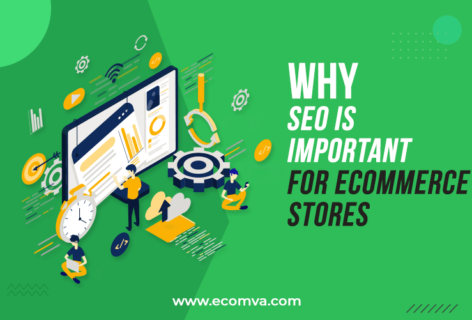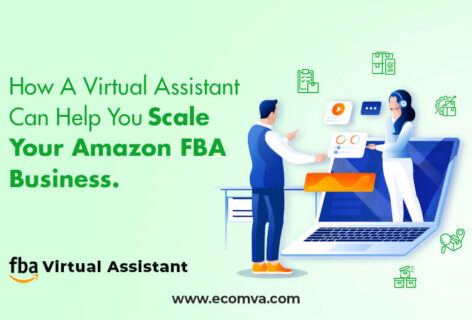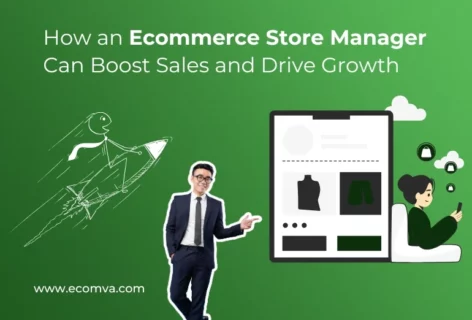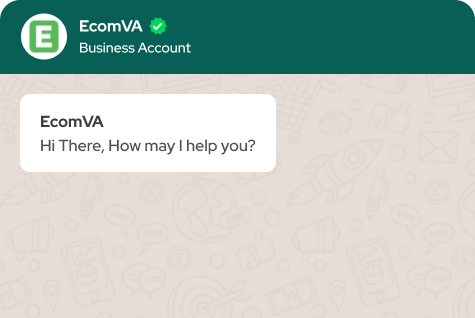The Growing Role of Virtual Assistants in the eCommerce Industry

It is clear that significant transformation has occurred in the eCommerce industry, considering that it has changed the face of interaction between businesses and consumers. For example, as per Statista, global sales through eCommerce would reach more than $6.3 trillion in 2024, which implies that the world is undoubtedly warping itself around digital marketplaces. However, along with such tremendous growth, challenges related to handling operations, scaling, and offering exceptional customer experiences arise.
Due to this, small and medium-sized eCommerce firms may find it resource-intensive and incompatible to employ a complete team for these tasks. This is where Virtual Assistant for ecommerce comes into play and provides affordable expert assistance to relieve operational stress. Outsourcing specific tasks to ecommerce virtual assistants enhances productivity and helps entrepreneurs manage their time effectively on other critical aspects of business development.
What is an Ecommerce Virtual Assistant?
An ecommerce virtual assistant is a work-from-home professional trained in managing various tasks directly related to online retail. Their expertise includes customer support, product listing optimization, inventory management, marketing, and data analysis.
These individuals are similar to virtual assistants, although the e-commerce VAs have specialized skills in websites such as Amazon, Shopify, WooCommerce, or Etsy. Their job profiles have changed a lot over the years, and they have become part of the businesses trying to gain an edge in the cut-throat competition in the digital market.
| Aspect | General Virtual Assistants | Ecommerce virtual assiatants |
|---|---|---|
| Task Scope | Administrative tasks, scheduling, email handling | Product listing, inventory management, and order processing. |
| Platform Expertise | Basic tools like Google Workspace or MS Office. | Proficiency in Amazon, Shopify, and social media tools. |
| Industry Focus | Broad, non-specific. | Tailored to eCommerce needs. |
Advantages of the Virtual Assistants for eCommerce
Hiring an e-commerce virtual assistant has better alternatives than maintaining a full-time in-house workforce.
Cost-Efficiency and flexibility
Outsourcing eCommerce virtual assistant services can be more cost-effective than hiring in-house staff. It does away with various payments such as salary, benefits, space in the office, and equipment. It allows hiring a VA on an hourly or project basis, enabling flexibility in the use of resources.
| Factor | Full-Time Employees | Virtual Assistants |
|---|---|---|
| Cost | Salary, benefits, office space, equipment. | Pay for only the hours worked or project-based fees. |
| Flexibility | Fixed schedules and roles. | Adaptable to changing business needs. |
| Hiring Time | Lengthy process with onboarding. | Quick access to pre-vetted professionals. |
Greater Efficiency
It is very challenging for an online business to accommodate several roles, such as the responsibility of customer relations and stocking. Outsourcing this simple but time-consuming work to ecommerce virtual assistants helps owners focus on other essential business tasks concerning product development, marketing and sales, and business expansion.
For instance, rather than spending days updating their products or answering customers’ inquiries, business owners will devote their time to searching for potential areas of expansion or developing new alliances. This improvement in focus streamlines day-to-day operations, leading to greater productivity and swift decision-making. Eventually, improvement in efficiency can lead to rapid business growth, enabling entrepreneurs to keep up with the competition.
Heightened Customer Satisfaction
In the high-volume and competitive ecommerce world, customer satisfaction ultimately differentiates successful businesses from the rest. A highly skilled and proficient e-commerce virtual assistant will handle customer inquiries by email, chat, or phone from a professional, petty perspective and usually resolve minor complaints, resulting in personalized solutions for very different customer needs.
Only satisfied customers will be more willing to make repeats and tell others about your brand, and such consumers pave the path for organic growth. For example, hiring a virtual assistant for ecommerce can create a follow-up procedure for post-purchase support, after which customers feel care-loving. This pro-activeness will go a long way in instilling confidence in the idea and building brand loyalty, which an eCommerce venture must have to survive in the long run.
Specialization by Platform
Every e-commerce platform—Amazon, Shopify, WooCommerce, or Etsy—operates under a specific ecosystem, and its set of rules and different needs must be optimized. Mastering these effectively is something a virtual assistant of ecommerce is perfectly skilled for.
From creating Amazon FBA accounts to developing Shopify product pages with SEO in mind, Outsource ecommerce tasks that require technical know-how and precision. An example would be keyword trends monitoring to increase the likelihood of product visibility or meeting platform-specific regulations to prevent penalties. By utilizing platform-specific skills, the benefits of virtual assistants in e-commerce are that they contribute to seamless operations, improved customer experiences, and, therefore, more sales for businesses.
Fundamental Duties of E-commerce Virtual Assistants
1. Customer Support
Customer services are the backbone of an ecommerce business. This is the area where virtual assistants can get example assignments and perform work for this critical aspect of the business as:
- Resolving Customer Queries: Dealing with interaction-related queries by VAs for customers, such as emailing messages and chatting, will make it by responding to them at the right time.
- After-Sale Assistance: One of the Virtual assistant roles in eCommerce is to advise on things like order tracking, returns, and refunds to transform possibly disappointing experiences into rewarding ones.
- Developing FAQs: VAs work to create detailed FAQ pages to enable customers to discover answers quickly.
2. Creating and Optimizing Product Listings
Product listings are the backbone of visibility and success for any eCommerce store. A Virtual assistant for ecommerce optimizes these listings, making them beautiful, informative, and easily discoverable by potential customers. This includes:
- Keyword-focused SEO description: Write keyword-based product descriptions that improve the product’s ranking on search engines and simultaneously bring in targeted traffic.
- Precise Inventory Update: Track stock levels and update product availability in real time to avoid overselling or stockouts.
- Better Images and Videos: Uploading high-quality images and videos effectively presenting product features.
Well-optimized product listing pages will drive traffic to them and increase conversion rates, thus having a direct impact on revenue.
3. Order Processing
This phase of order processing constitutes a significant part of the operations of ecommerce. Virtual assistants help simplify it by:
- Lifecycle Management: Following order confirmation, ensure the accuracy and timely dispatch of orders.
- Returns and Refunds: Cut down on time involved in the entire return, refund requests, and escalating customer grievances to maintain customers’ confidence.
- Coordination with Suppliers: A VA can act as a communication bridge with a supplier to restock and fulfill an order at the proper time.
Streamlined order processing improves customer satisfaction yet decreases the probability of errors that would otherwise tarnish the brand’s image.
4. Marketing support
Marketing is the backbone of an ecommerce business: it draws up traffic for increasing sales rates. Ecommerce virtual assistant services, in this regard, help the company through:
- Email Campaigns: Designing and managing email marketing campaigns to help engage customers and offer them new products.
- Social Media Management: This includes all the activities one should undertake to build social building media accounts, create and post content, engage with fans, and run paid advertising campaigns.
- Influencer Outreach: It is generally the working out of brands with influencers to create brand awareness and credibility.
All of the above allow VAs to enhance a business’s online presence, encouraging engagement and increasing sales.
5. Data Management and Reporting
Current-day competitive markets are increasingly data-driven. The following are ways through which virtual assistants contribute to this:
- Market Research: Acquiring data about competitors, industry-wide trends, and customer preferences to find opportunities and challenges.
- Sales Reports: Hiring a virtual assistant for ecommerce helps create detailed performance reports for the organization that can track key metrics and evaluate marketing and sales strategies.
- Data Entry and Organization: Keeping the databases continually updated and running without interruption and with increased accuracy.
Trends Driving VA Adoption in Ecommerce
1. Omnichannel Strategy
Modern-day ecommerce businesses are developed over several channels, including marketplaces, social media, and their websites, to manage everything involved-not only listings and marketing but also customer interactions. Ecommerce virtual assistants can be a boon in these areas.
2. Automated Processes for Human Interaction
Even though automation tools can automate most repetitive tasks, human input remains vital in handling customized customer interactions and managing complicated operations. VAs provide a perfect blend of automation and personal touch.
3. Work Force Scalable Solutions
The need for virtual assistants has dramatically increased due to the growing preference from companies to develop their remote workforces. Therefore, they give the flexibility to change the number of workers to fit whatever workloads are required and business needs occur.
Bottom Line
Virtual assistants in ecommerce have been made essential; this is no longer optional. The reason is that they are the ones who will help businesses acquire a competitive advantage, whether through improved efficiency or customer satisfaction, as ecommerce virtual assistants help them maneuver through the intricacies of the digital market.
So, are you ready to streamline your ecommerce workflow? Unlock your business’s full potential by applying EcomVA’s specialized services.
FAQs
1. How can a virtual assistant help my ecommerce business?
The VA performs the everyday tasks, optimizes the listings, and monitors the customer contact points, so you have time to devote to strategic objectives.
2. What can I delegate to an ecommerce virtual assistant?
Tasks such as product listing, inventory management, customer support, marketing campaigns, and data analysis can be directed to them.
3. How much would it cost me to hire an eCommerce VA?
The average fee ranges from US$8 to US$30 per hour, depending on the VA’s experience and the complexity of the assigned work. To learn more, click here.
4. Should I hire a VA in-house or outsourced?
Outsourcing provides flexibility, cost savings, and access to a global talent pool. Compare the options here.
5. In what ways do VAs raise sales figures?
VAs optimize product listings, manage marketing efforts, and provide impressive customer services, which result in higher sales performances.











